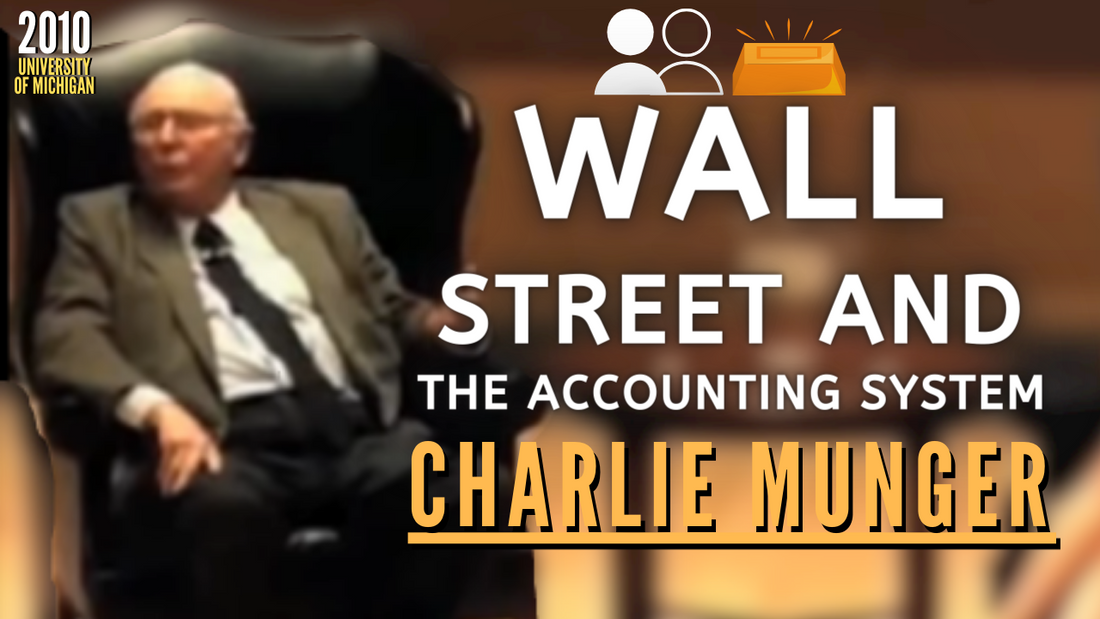
Charlie Munger: Easy Money Corrupts & Really Easy Money tends to Corrupt Absolutely | UM 2010【Ep191】
[Transcript]
BECKY QUICK: You know, a lot of the students that are in this room could be here from the business school and there's a real sense around the country at this point that Wall Street is a bad place.
There was a column today in the New York Times that Andrew Ross Sorkin wrote, where he sat down with Oliver Stone who's got his new movie coming out "Wall Street 2." And he asked, he said, you know, I don't think Wall Street's an evil place, maybe Goldman Sachs. But he does think that there are some serious bad guys who populate Wall Street. What do you think about that?
CHARLIE MUNGER: Well, if you're in a miasma of competition and they use the word that is so popular 'Greed.' And you'll attract very competitive people and they're thrown into this miasma, of course, there's going to be more regrettable behavior than you might find in a monastery or at least then we thought we might find in monasteries before we understood them better. And the – And so of course, Wall Street is going to have more regrettable behavior.
And you know, Lord Acton have this law you all talked to the power corrupts and absolute power tends to corrupt absolutely. Well, the Munger version of that is that easy money corrupts and really easy money tends to corrupt absolutely. And I don't think it was good for Wall Street that they had this absolute torrent of really easy money. When idiots and knaves were making a fortune selling shoddy mortgages with ridiculous theories. It was very regrettable behavior and it was the easy money that allowed it.
And, of course, the adults who could have fixed it like the accountants who had particular standards without which [Inaudible] while the bad behavior wouldn't worked, the accountants utterly failed us. And by the way, there's practically no sign of any intelligent reversal of that failure of that profession. I have yet to meet many accountants who are the least bit ashamed for their contribution to our recent troubles, but it was immense.
Imagine when Enron comes down to the SEC and says, we want to write a little contract with A and a little contract with B, and take all the profit we're going to make from these complicated contracts over the next 20 years into earnings immediately and put an asset on our balance sheet of $28 million from signing two pieces of paper.
And the SEC led by wonderful accountants that study of great places, why of course you should have that kind of accounting.
What the hell were they thinking? How could anybody have any respectable understanding of human nature without realizing that the kind of people who are going to be tempted by that accounting, we're not going to be able to resist the temptations. It was disgusting and they're not ashamed yet.
So how many people have you heard lately talk about how ashamed our accountants ought to be at our recent troubles? Nobody's blaming them. They assume it's like addition, it isn't like addition.
The system of accounting for grad debts of banking – Banks is carefully set up so the top of every Boom, the bad debt rate goes to 0. Who would a nutcase would have that kind of accounting system? I mean, I'm not making this as a joke. This is not a parody, these are the accepted accounting principles of your nation.
BECKY QUICK: Why do you think that has not been the focus? And do you think Fin. Reg. and Basel 3 are a joke?
CHARLIE MUNGER: Partly the establishment accountants want to please the people who are writing the checks, and partly the academic accountants get full of people who overdosed on mathematics and they want everything to be in balance.
And I don't think that – that really isn't rational and creating rules for human behavioral system. They are too mathematical and not rational enough and dealing with their fellow humans. You can't give the average Wall Street CEO really lenient standards of accounting and expect the figures to be good.
The account is like the referee in soccer. The accountant has to be the adult who prevents the mayhem. The accountants don't want to be the adults because it caused liability, because responsibilities, difficulty, and I have to be good at things they not sure they know, a lot of reasons why they shrink from it.
But it's their duty under God and they failed us terribly. We lost the referee.
BECKY QUICK: That makes it sound like those CEOs are inherently bad people, but they won't follow the rules themselves unless there's someone there with a stick to beat them back in line.
CHARLIE MUNGER: Well, I do think the CEO culture is likely to promote people who are very competitive, and very driven, and very aggressive and accomplishing what they want to do. And that means if the guy down the street is doing something enables him to report more, they want to be like the guy down the street. They can't help themselves, they're that competitive.
I don't believe in being that competitive. I believe it's part of human merit to know like Kipling, you don't lose your head when everybody else's losing theirs. Somebody else makes a lot of money or report a lot of money, let them, you know. It's this envy thing – it's pernicious.
And this caused a huge problem and a huge danger for our republic to have all these people competing to report phony earnings. You think they were really earning this money from this mortgage trading? Look at the write-offs.
Are you really earning money when you put something on your balance sheet that really isn't there? When you reach for it will fade away like mist. What the hell kind of a system is that? It's an utterly irresponsible system.
You can't blame the miscreants as much as you count the adults who were – whose duty it was to prevent the miscreancy? Somebody said, you can't blame a tiger for behaving like a tiger. You got to have a gamekeeper.
BECKY QUICK: Does that mean we should also look at Washington and the regulators?
CHARLIE MUNGER: Well, if you think accountants pay poorly. (Laughter)
Washington set a new record. I have a rule for politics which has served me well in making predictions and that I quit claim to you. The politicians are never so bad you don't live to want them back.
(Source: https://youtu.be/Pph3Bg8Pihg)
[YAPSS Takeaway]
1. Easy Money Corrupts & Really Easy Money tends to Corrupt Absolutely. ~Charlie Munger
2. I don't believe in being that competitive. I believe it's part of human merit to know like Kipling, you don't lose your head when everybody else's losing theirs. Somebody else makes a lot of money or report a lot of money, let them, you know. ~Charlie Munger
